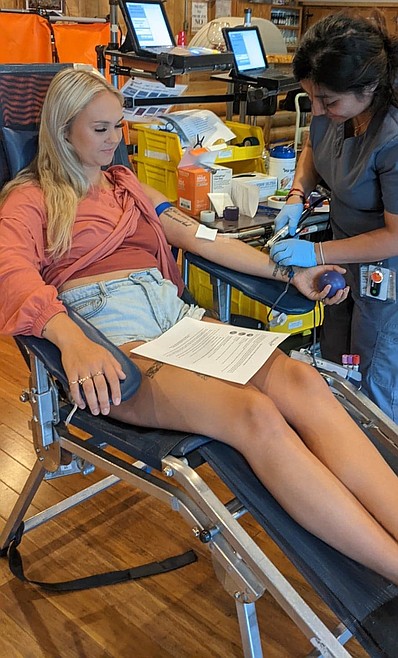Give blood, save lives
KELLOGG — Local blood drives, like the one recently held at the Kellogg Elks, are critical as Idaho, and the United States, continue to face a national blood shortage.
To assist in this crisis, a successful blood drive, hosted by Vitalant, took place at its regular location at the Kellogg Elks earlier this week.
Shoshone News-Press spoke with Vitalant’s North Idaho Territory Manager, Aubrey Lewis, about Kellogg’s most recent blood drive.
“We checked in 21 people, and from those 21 we were donated four power reds, which are the more concentrated donation and 17 whole blood donations, which are the most common type.”
Whole blood is the most flexible type of donation. It can be transfused in its original form or used to help multiple people when separated into its specific components of red cells, plasma and platelets.
Whole blood is most often donated to trauma patients and people undergoing surgery.
Power reds donation is similar to a whole blood donation; however, a machine is used to allow the volunteer to safely donate two units of red blood cells during one donation while returning the plasma and platelets back to the person. Red cells from a power red donation are also given to trauma patients. They can also be used for newborns and emergency transfusions during birth, people with sickle cell anemia, and anyone suffering from blood loss.
Donating blood has always been an essential factor in the health care field as blood is used to help patients survive surgeries, cancer treatments, chronic illnesses and traumatic injuries.
Earlier this year, the American Red Cross announced that the U.S. is facing a national blood crisis — its worst blood shortage in over a decade.
ARC has reported that many factors play a part in the shortage, with blood drives being canceled due to the surge of Omicron, blood bank staff being out sick, and fewer people donating in general.
“Doctors have been forced to make difficult decisions about who receives blood transfusions and who will need to wait until more products become available,” ARC said in a release. “Blood and platelet donations are critically needed to help prevent further delays in vital medical treatments.”
The demand for blood is high, and Vitalant prefers to have a four-day supply on hand but is now down to a two-day supply, which is its lowest in a few years.
Lewis explained, “Unfortunately, we are still in a critically urgent need right now with a two-day supply.”
A critical shortage is not easily overcome, as it can take additional daily donors to provide the hospital blood more quickly than it’s being used to help patients. Vitalant stresses that donating blood is safe and very fast, with most blood donors comparing the experience to a mild, split-second pinch.
“We just had a great day out in Kellogg, we always really enjoy going out to that community,” Lewis said.
Vitalant was founded in 1943 and is one of the nation’s oldest and largest nonprofit transfusion medicine organizations, providing blood and special services to more than 35 hospitals in the North Idaho and Montana region.
The next Vitalant Community Blood Drive in Kellogg will be on Oct. 4 from 1-5:30 p.m. at the Kellogg Elks, located at 202 1/2 McKinley Ave. W., Kellogg.
To learn more about eligibility or to sign up to donate, visit vitalant.org.

